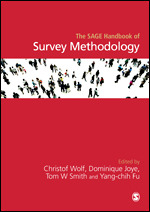The SAGE Handbook of Survey Methodology
- Christof Wolf - GESIS - Leibniz Institute for the Social Sciences, Germany
- Dominique Joye - University of Lausanne, Switzerland
- Tom W Smith - University of Chicago, USA, University of Arkansas, Fayetteville, University of Arkansas at Little Rock, USA, University of Alabama at Birmingham, USA
- Yang-chih Fu - Academia Sinica
Survey Methodology is becoming a more structured field of research, deserving of more and more academic attention. The SAGE Handbook of Survey Methodology explores both the increasingly scientific endeavour of surveys and their growing complexity, as different data collection modes and information sources are combined.
The handbook takes a global approach, with a team of international experts looking at local and national specificities, as well as problems of cross-national, comparative survey research. The chapters are organized into seven major sections, each of which represents a stage in the survey life-cycle:
- Surveys and Societies
- Planning a Survey
- Measurement
- Sampling
- Data Collection
- Preparing Data for Use
- Assessing and Improving Data Quality
The SAGE Handbook of Survey Methodology is a landmark and essential tool for any scholar within the social sciences.
This exciting new handbook provides a comprehensive guide to conducting survey research studies. Authored by a distinguished set of experts from across the globe, chapters cover all phases of survey projects—from conceiving, designing and planning, through sampling, measurement, and data collection, to post-fieldwork data processing, data augmentation, and quality assessment. Extensive attention to multi-national or cross-cultural survey projects is a special asset: both challenges to comparability in such studies, and current practices to achieving it in vital domains including sampling, translation, and harmonization of data over space and time, are treated in depth.
The environment for conducting surveys has changed substantially in the last several decades. New approaches to data collection and data dissemination are required, but the approaches must be adapted depending on country and culture. This Sage handbook is an up-to-date reference that covers virtually all steps in the survey life cycle. It contains methodological topics like survey modes, surveying in multicultural and cross-cultural contexts, questionnaire design and pretesting, and responsive design, along with statistical topics like sampling, weighting, analysis of complex surveys, and record linkage. Coverage of distinctive areas, like ethical issues, surveys in conflict areas, question translation, and harmonization of questions across cultures, also set this book apart from others. The handbook will be a valuable reference for survey practitioners and other professionals who need a broad overview of the many steps required to conduct high quality surveys.
The new Sage Handbook broadens our view of survey research by including topics important for data sharing and reuse. Data are expensive public resources, and we need more attention on issues like disclosure risk, harmonization, life-cycle documentation, and preservation.
"The SAGE Handbook of Survey Methodology is a useful resource for researchers and individuals who want to learn about the process of surveying. In an era where surveying is so hotly debated, the handbook comes at an important moment in history. This book is recommended for academic libraries."
"This thorough volume provides extensive information on understanding and creating surveys. Its 43 chapters cover important topics such as types of surveys (face-to-face, mail, internet), designing questions for surveys, sampling, administering surveys, handling ethical issues, combining administrative and survey data, and analyzing data from surveys... Summing Up: Highly recommended. Faculty and professionals"
The SAGE Handbook of Survey Methodology is a valuable compendium and reference reflecting a broad range of expertise from the survey world and beyond.The authors of the 43 chapters represent a diverse group of institutions, mainly from the United States and Europe, and bring a deep expertise on their given “assignments. For those whose research depends on the quality of survey data, especially in an international context, the Handbook is a solid and dependable anchor.
Sample Materials & Chapters
Chapter 33 - Harmonizing Survey Questions Between Cultures and Over Time










